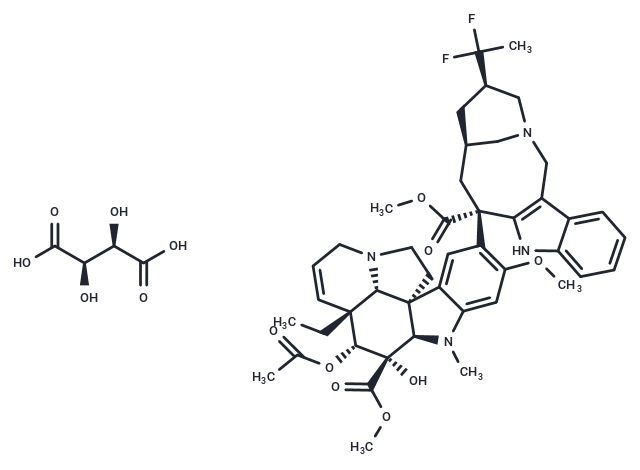Shopping Cart
- Remove All
 Your shopping cart is currently empty
Your shopping cart is currently empty

Vinflunine Tartrate, a uniquely fluorinated vinca alkaloid, exhibits mitotic-arresting and tubulin-interacting properties.

| Pack Size | Price | Availability | Quantity |
|---|---|---|---|
| 2 mg | Inquiry | Backorder | |
| 5 mg | Inquiry | Backorder | |
| 10 mg | Inquiry | Backorder | |
| 25 mg | Inquiry | Backorder | |
| 50 mg | Inquiry | Backorder | |
| 1 mL x 10 mM (in DMSO) | Inquiry | Backorder |
| Description | Vinflunine Tartrate, a uniquely fluorinated vinca alkaloid, exhibits mitotic-arresting and tubulin-interacting properties. |
| In vitro | The major effects of Vinflunine on dynamic instability are a slowing of the microtubule growth rate, an increase in growth duration, and a reduction in shortening duration. The effects of Vinflunine on the readmilling rate is examined by following [3H]GTP incorporation into MAP-rich microtubules, and the IC50 is 0.42 μM. [1] Vinflunine induced mitotic accumulation with IC50 with 18.8 nM, which decreases the centromere dynamicity by 44% and increases the time centromeres spent ina paused state by 63%. [2] Vinflunine ditartrate exhibits microtubule inhibition (purified tubulin and MTP) and cytotoxicity in L1210 cells with IC50 of (0.49 μM and 3.5 μM) and 97 nM, respectively. [3] Vinflunine induces apoptosis in neuroblastoma SK-N-SH cells through a postmitotic G1 arrest and a mitochondrial pathway in a concentration-dependent manner with an IC50 with 50 nM. sup>[4] Treatment of Vinflunine induces a rapid change in endothelial cell shape: cells retracts and assumes a rounded morphology. Mean IC50 values are 9.9 x 10-5 M x 10-5 M for fibronectin and 5.0x 10-5 M x 10-5 M for type IV collagen. A short 4 hours exposure of endothelial cells to Vinflunine at 10-8 |
| In vivo | Intravenous treatment of mice with Vinflunine, immediately before and 2 day after Matrigel implantation, results in a dose-dependent inhibition of the bFGF-induced angiogenic response, compared with vehicle-treated animals. Inhibition of haemoglobin content is significant at 1.25, 2.5 and 5 mg/kg, with no effect at 0.63 mg/kg (P > 0.05). An ID50 value (dose which inhibits 50% of bFGF-induced neovascularisation) is calculated as 1 mg/kg. Low doses of Vinflunine reduce the number of experimental liver metastases by human LS174T colon cancer cell. A slight overall decrease in liver metastatic foci is already observed at the very low dose of 0.16 mg/kg Vinflunine, although maximal overall inhibition is reached at the maximal tolerated dose (MTD) of 20 mg/kg. [5] |
| Kinase Assay | Determination of Microtubule Polymer Mass: Purified tubulin (17 μM) is polymerized into microtubules in the abence or presence of a range of vnflunine concentrations (35 minutes; 37 °C) in 75 mM PIPES, 1.8 mM MgCl2, 1.0 mM EGTA, and 1.5 mM GTP (pH 6.8) using sea urchin (Strongylocentrotus purpuratus) axonemes as seeds for assembly initiation. After incubation, polymerized microtubules are separated from unpolymerized tubulin by centrifugation (150,000 × g; 1 hour; 35 °C). The supernatant is aspirated, the sedimented microtubules are depolymerized in assembly buffer by incubation on ice (2 hours), and the protein content is determined. |
| Cell Research | Effects of Vinflunine on L1210 cell proliferation are determined using a standard growth inhibition assay. Exponentially growing L1210 cells (1.5 × 105 cells/well) in a 24-well plate are exposed to a range of concentrations of test compounds for 48 hours, prior to determining cell numbers using an electronic particle counter based on linear interpolation between data points.(Only for Reference) |
| Molecular Weight | 967.02 |
| Formula | C45H54F2N4O8·xC4H6O6 |
| Cas No. | 1201898-17-0 |
| Relative Density. | no data available |
| Storage | Powder: -20°C for 3 years | In solvent: -80°C for 1 year | Shipping with blue ice. | |||||||||||||||||||||||||
| Solubility Information | DMSO: 45 mg/mL (46.53 mM), Sonication is recommended. | |||||||||||||||||||||||||
Solution Preparation Table | ||||||||||||||||||||||||||
DMSO
| ||||||||||||||||||||||||||

Copyright © 2015-2025 TargetMol Chemicals Inc. All Rights Reserved.